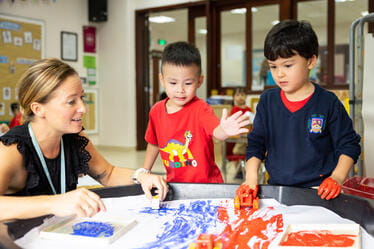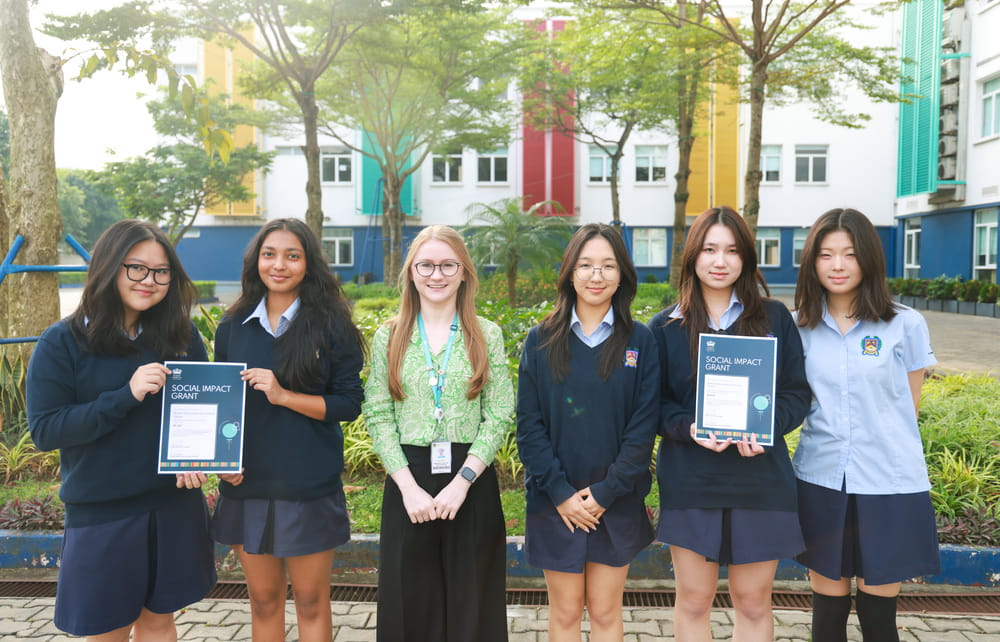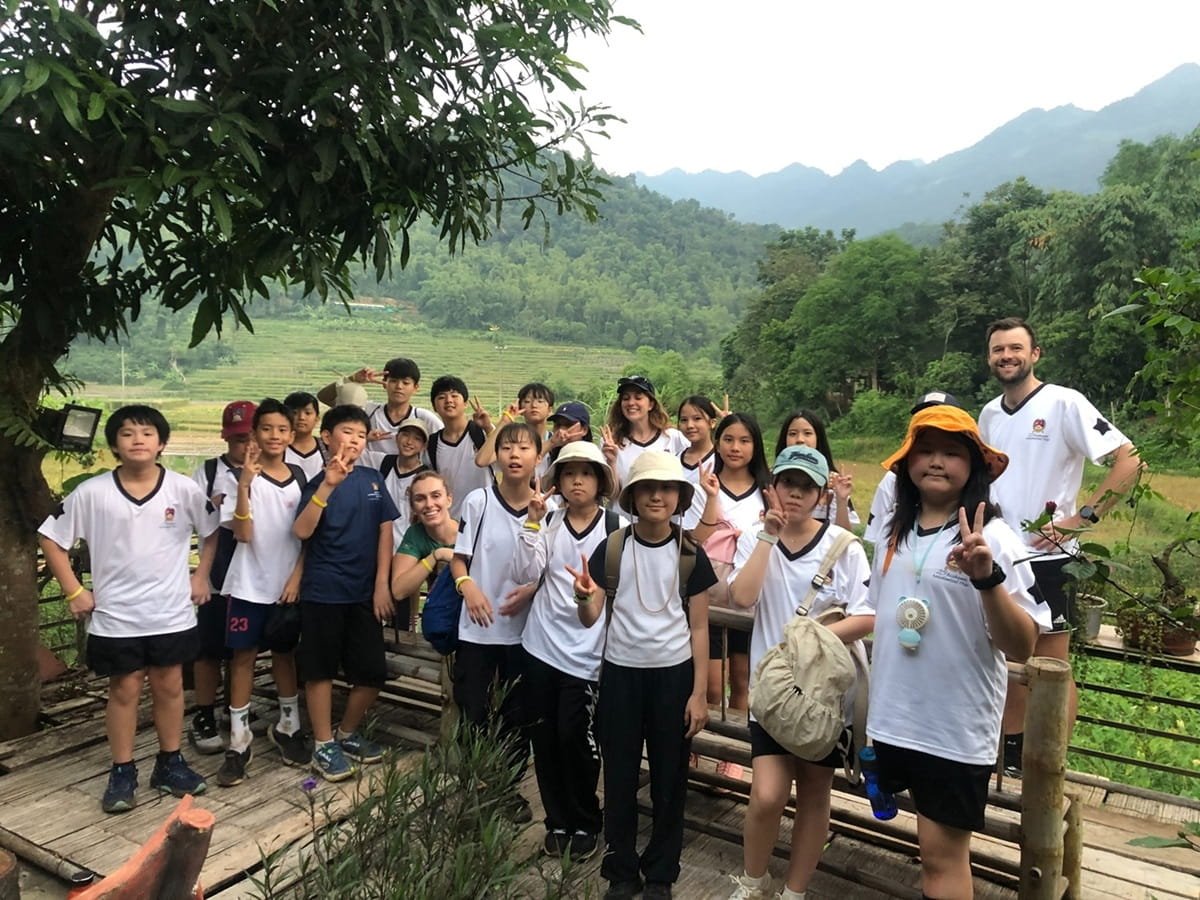Secondary School Updates (3 December 2021) With Term 1 soon coming to a close, we have been reflecting on the achievements of the last 15 weeks of schooling.
Key Dates | Pastoral Update | Library Update | University Counselling | Virtual Learning Showcase
Weekly update from Head of Secondary
Dear Parents,
With Term 1 soon coming to a close, we have been reflecting on the achievements of the last 15 weeks of schooling.
We are most proud of the way our community – students, teachers, and parents - have embraced the virtual school. Student attendance is impressively high at over 98% and student effort has remained robust at the level seen at the same time in face-to-face learning. Notably, we have seen 1,664 Virtual Learning Star nominations in Term 1, a new record, and a reflection of the vibrant learning and committed students. Additionally, House points, which are given for achievements and encouragement, have also reached a peak never seen before, up to over 73,000 in total.
We are so grateful to everyone at BIS Hanoi for the positivity, resilience, and open-mindedness that we have witnessed this year so far. We hope that soon we will be back together on campus. In the meantime, the wonderful work happening in the Virtual School continues.
Chris Newman
Head of Secondary
- Tuesday 7 December: Year 10 Parents’ Evening
- Friday 17 December: Last Day of Term 1
- Tuesday 4 January: First Day of Term 2
- Thursday 6 January – Tuesday 18 January: Year 11 and 13 Trial Examinations
Getting enough sleep is a serious issue throughout the world in these high-pressured modern times. This is currently, and has been for some time, a major issue for our school and our students, particularly, so it seems, in the Sixth Form. Time and again I speak to students who are struggling with their organisation, meeting deadlines or motivation to learn, and find out about their poor sleep habits.
Many students I speak to work, or play online, until very late hours, or early hours in the morning. A large number regularly get as little sleep as 3 or 4 hours a night, a some get even fewer. Medical science has established that teenagers need a routine night’s sleep of no fewer than 8 hours a night. Any less than this runs the risk of them developing emotional, mental or other health issues, as well as seriously impact on their academic progress.
So, what are the causes of this lack of sleep amongst our Sixth Form students?
Many have told me that the pressures of work and time imposed upon them by the IB Diploma mean that they can’t get enough sleep as they need to be continuously working. Although the IB Diploma is designed to be a rigorous programme of study, and is indeed extremely challenging, the workload should be manageable if students use their available study time well. Here at BIS Hanoi we have tried to teach the students different planning strategies and tools that they can use to allocate time to the various tasks demanded by the IB Diploma. Forward planning is critical. There are multiple deadlines of important coursework for all subjects in the diploma programme, and at several times in the year multiple deadlines coincide. That is unavoidable due to the nature of the diploma, but students can avoid backlogs of work if they look ahead at their assessment calendar and plan accordingly.
Homework is also mentioned by our students. However, we have a dedicated, caring and understanding faculty of teachers and tutors here, and a broad support network of staff members to help students who struggle with weekly workloads. Students need to be encouraged to reach out and communicate to their teachers if they are falling behind in homework, and to see if there is some flexibility in the deadlines for this, as opposed to working throughout the night and putting their next day’s study at risk. The worst-case scenario for students who miss a homework deadline is a detention – which does sound bad for many of our conscientious students, but is much, much better than missing a night’s sleep.
Other pressures on time can come from outside of school, however. Many students have several hours of additional lessons outside of school hours, meaning they must push their IB school work later and later. Lessons for SAT preparation can be important, but it is vital that you and your child check whether SATs are even required for the universities they may be considering. Korean Academy lessons may also add extra workload. And IELTS lessons should not be taken by any IB student, who would be getting more than sufficient training in spoken and written English from their IB lessons in order to prepare them for the IELTS exam. It is very important that families look closely at the additional pressures that the students’ time is placed under, and prioritise their health, happiness and school work. After all, university acceptances will be decided on their IB results over any other qualifications.
However, there are many of our students who admit to gaming online, or using social media, watching videos on Tik-Tok or Netflix late into the night and the following morning. The use of a device so late at night is dangerous on its own, but when it deprives the young person of their sleep it becomes a serious health issue.
What can parents do to support their child – especially if they are defiant, nearly young-adults?
It can be extremely challenging, but rest assured your child is receiving the same guidance from us at school. It may help to open a conversation with your child about their sleep habits, look into where their gaming or social media devices are kept after bedtime, and encourage them to keep a sleep diary (we have provided them with one!). For students who still find it difficult to get to sleep, as they are anxious about work, deadlines or other issues, encourage them to keep a notepad and pencil by their bed – they should write their worries down so they can be satisfied they won’t forget them and can get to work on these challenges fresh and alert the next day.
What are the risks to young people of maintaining a poor sleep habit?
Sleep and grades: in a study of two groups, one who slept 8 hours and another who were sleep deprived, the difference between grades (learning) was 40%. Studies by Williamson and Feyer demonstrate that people who have 6 or fewer hours of sleep a night are as impaired in their thinking as someone who is drunk. In addition, even one sleepless night of 4 hours or less has the same impact as 2 weeks of less than 6 hours of sleep. This shows that even occasional nights of sleeplessness have drastic effects. Those students who email us with updates for work at 1 am, 2 am, 4 am are seriously reducing their potential to succeed – and much worse besides.
We have worked hard to try to educate our Sixth Form students on the importance of sleep. It is important for the school and parents to work together on these issues and help support our young people. Please do get in touch with me if you have concerns about your own child, or ideas of how to support the message that we are all trying to pass on.
Rob Airdrie
Head of Sixth Form
Need a new fiction eBook to read?
BIS Library purchased 150 new eBooks in October.
How can you read these eBooks?
Go to the BIS Library site
- Enter “eBook” into the FIND A BOOK search box in the top left
- You are now in Destiny. Click on the Login button in the top right.
- Click on the blue SAML-SSO button on the left (NOT the white Follett box)
- Enter your Microsoft school email and then your password.
- Click on the eBook you want to read.
- Click on the Open button and start reading.
Here is a screencast showing exactly how to do it.
You will know you are logged in when you see your name next to Welcome Back in the top right corner.
Webinar reminder – all students and parents are welcome to join
Thursday, 9 December 2021, 3pm-4pm: University of Oxford
Follow this link to register for the event.
We have the absolute pleasure of welcoming Mr James Brown from the University of Oxford to hold a webinar for our NAE student community in Vietnam. As the university doesn’t really need an introduction, it will be exciting to hear about its college system and the idea of Best Fit. This will be the perfect opportunity to ask questions specifically relating to Oxford.
Korean | Maths | MFL | Science | Humanities
Year 9 Korean Digital Gallery Walk
Year 9 Korean students conducted a digital gallery walk based on poems they have created. They studied one of famous poets in Korea named ‘Ahn Do Hyun’ and went through his work by analysing and annotating it. They created an imitative poetry and a digital museum for a gallery walk. The work consists of their drawing and poems and explanation. The main theme of the message they would like to portray in every work was that we need to be caring to all creatures even though it is so small. It was a such a great opportunity to visit and found out the way to appreciate literature.
This week has been a time for reflection for some of our Year 8 mathematicians. Having spent the first 4 months of this academic year online, it is important for students to reflect on the development of their skills as learners. This reflection puts equal importance on their Ways of Doing (mathematical understanding), Ways of Being (communication, risk-taking and care) and their Ways of Thinking (inquiry, thinking and reflection), as all of these skills are vital for our students so that they can become happy, successful and fulfilled adults.
Key Stage 3 students complete these reflections after every unit of work, selecting one attribute each from the Ways of Being and Ways of Thinking that they feel they have demonstrated strength in, giving reasons and examples for their selection. Students also select an attribute they feel they need to develop further and give examples of how they will achieve this. Finally, students reflect on their understanding of the mathematics that has been covered and discuss which concepts they are proud to have persevered to understanding on, and which concepts they feel they need to spend more time reviewing.
We are very excited to launch a virtual science fair for our key stage three students. All students in Years 7, 8 and 9 will be using and developing their Ways of Doing science: acquiring and using knowledge, investigating appropriately and analysing what they find out. Students will be using their ways of being too, as they will be communicating what they find out when the fair comes to an end. We hope they will take risks by pushing themselves but that they will also work safely and responsibly. They will be using their ways of thinking by inquiring and at the end of the fair we will ask the students to reflect on their work. Throughout the fair, students will be caring by doing their best quality work.
Students have been given a PDF with options for them to choose from, or they may come up with their own idea to investigate. They will be working on their science fair project in Science and in PE lessons over the next two weeks and we are really looking forward to showcasing what they do!
Reading is one of the best things that you can do to improve your language acquisition and although we all know the benefits of reading in English and in our home language, maybe reading in French or Spanish isn’t something that our students do independently at home.
However, with a login for Get Epic, our students have access to hundred of books and comics in French and Spanish. Key Stage 3 students can use their library login to find a book and Key Stage 4 and Key Stage 5 students can ask their MFL teacher if they don’t currently have access.
Year 12 French Ab Initio have been using Get Epic all term to enhance their vocabulary, cultural understanding and enjoyment of learning French. Just 5-10 minutes a day can make all the difference in your learning of the language.
Here are some of the books that Year 12 have been enjoying – they have said that they love being able to read story books and comics, which can feel very enjoyable after a long day of online learning!
Geography
Our Year 11 students have been learning about issues relating to the supply and demand of global energy over the last few weeks. This week, they have applied their knowledge to a familiar case study of Iceland, demonstrating superb creativity and attention to detail to produce a summary of how Iceland supplies its energy to their population. They have submitted their work in a variety of different forms, ranging from superb infographics, passionate speeches, presentations and even a rap video. Well done Year 11!
History
Our Year 8 students have been learning about Henry VIII and his impact on England this term. They have considered whether he was a strong king or a cruel Tyrant, whilst also considering – why did he have so many wives? Students were tasked with mini projects and each assigned a wife to research and then report back to the class about how suitable their wife was for Henry. Students then completed a flipgrid assignment where they spoke of which wife they thought was the best for Henry and why. Lots of different opinions! Moving into next week, students will start looking at his daughter Elizabeth I – how similar was she to her father? Why did she never marry?






